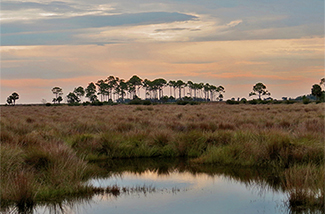Climate Change and Resiliency Initiatives in Northeast Florida
Northeast Florida decision makers have taken a long time to come to the realization that our climate is changing, ocean levels are rising, and our communities need to make serious efforts to improve our resiliency in the face of these threats. We are glad to see that government leaders and environmental organizations in our area have begun several initiatives aimed at reaching solutions to address the effects of climate change and sea level rise.
Duval Audubon Society supports the following resiliency and climate change initiatives:
 RenewJax is a campaign of the Sierra Club of Northeast Florida (SCNEF) to create a coalition of like-minded groups and residents, uniting to urge and pressure the City of Jacksonville (COJ) and Jacksonville Electric Authority (JEA), the city-owned electric, water and sewer utility, to commit to using renewable energy to power city operations and homes by 2050. Learn more at RenewJax.org.
RenewJax is a campaign of the Sierra Club of Northeast Florida (SCNEF) to create a coalition of like-minded groups and residents, uniting to urge and pressure the City of Jacksonville (COJ) and Jacksonville Electric Authority (JEA), the city-owned electric, water and sewer utility, to commit to using renewable energy to power city operations and homes by 2050. Learn more at RenewJax.org.
The Resilient Jax coalition was formed in early 2020 with members representing a variety of environmental and conservation organizations in our area. The mission of the Resilient Jax coalition is, “To work collectively to propel equitable and proactive solutions that address the cause and effects of climate change in Northeast Florida through advocacy, education, and community involvement.” In August 2022, Resilient Jax announced they are changing their name to Jacksonville Climate Coalition to better reflect the mission of the coalition.
Several Resilient Jax coalition members also served on subcommittees of Jacksonville City Council’s Special Committee on Resiliency, which was appointed in January 2020 by then City Council President Scott Wilson in order to “comprehensively assess the resilience and health of the beaches coastline and the St. Johns River system, including its tributaries, wetlands and riparian land. Part of this assessment was to review city environmental, land use and infrastructure policies that affect these valuable and often vulnerable county assets and the health and safety of our citizens.” The Special Committee reported its findings and recommendations in February 2021.
Funding for a Chief Resilience Officer was included in Mayor Lenny Curry’s 2020/2021 budget, which was approved by the City Council on September 21, 2020. After and exhaustive nationwide search, Anne Coglianese was hired as Jacksonville's Chief Resilience Officer in July 2021. Jacksonville was the last of Florida’s major cities to hire a resiliency officer, so the Jacksonville community has a lot of ground to make up in terms of implementing effective actions to protect the city. We hope Ms. Coglianese will have the authority, funding, and personnel needed to achieve the goal of making Jacksonville more resilient in the face of rising waters due to climate change.
 Local Groundwork USA affiliate Groundwork Jacksonville is building an “Emerald Trail” around the downtown and northwest area of Jacksonville. This project will provide parks and walking/biking trails along McCoys Creek and Hogans Creek (both tributaries of the St. Johns River) and will also incorporate flood zones for these two creeks which have historically been major flood areas. One of the most important aspects of this project is that it is in the urban core and will provide parks and flood relief to many underserved communities.
Local Groundwork USA affiliate Groundwork Jacksonville is building an “Emerald Trail” around the downtown and northwest area of Jacksonville. This project will provide parks and walking/biking trails along McCoys Creek and Hogans Creek (both tributaries of the St. Johns River) and will also incorporate flood zones for these two creeks which have historically been major flood areas. One of the most important aspects of this project is that it is in the urban core and will provide parks and flood relief to many underserved communities.
Riverfront Parks Now, an initiative of Scenic Jacksonville and joined by The Garden Club of Jacksonville, St. Johns RIVERKEEPER and the Late Bloomers Garden Club and supported by other conservation organizations, including Duval Audubon, has proposed the development of much of the city’s downtown north bank of the St. Johns River into a resiliency park. This area was heavily flooded during Hurricane Irma in 2017. Jacksonville's mayor has been inclined to sell this property to private businesses who would (presumably) fortify the riverbanks with hard structures and build right up to the river. Riverfront Parks Now instead proposes the creation of a riverfront park with areas of natural wetlands and flood overflow that would also provide natural recreation open to all, encourage people to go downtown, and provide business opportunities as well as flood protection for downtown businesses.
 Our chapter has also lent support to Free the Ocklawaha, a coalition of many of Florida's major environmental organizations. Its mission: "To restore the Ocklawaha as a free-flowing River, reconnecting the Silver and St. Johns Rivers, and elevating the regional benefits for all." The Ocklawaha River is the largest tributary of the St. Johns River and flows from Silver Springs to the St. Johns River near Palatka in Clay County. This initiative seeks the removal or breaching of the Kirkpatrick Dam (also known as the Rodman Dam), which would result in the restoration of the natural flow of the Ocklawaha River and release the flow of twenty springs that have been suppressed by the weight of the water in the pool created by the dam.
Our chapter has also lent support to Free the Ocklawaha, a coalition of many of Florida's major environmental organizations. Its mission: "To restore the Ocklawaha as a free-flowing River, reconnecting the Silver and St. Johns Rivers, and elevating the regional benefits for all." The Ocklawaha River is the largest tributary of the St. Johns River and flows from Silver Springs to the St. Johns River near Palatka in Clay County. This initiative seeks the removal or breaching of the Kirkpatrick Dam (also known as the Rodman Dam), which would result in the restoration of the natural flow of the Ocklawaha River and release the flow of twenty springs that have been suppressed by the weight of the water in the pool created by the dam.
Duval Audubon has also joined Florida Climate Voices, a new clearinghouse for climate related activities and experiences. This is a movement that grew out of Rethink Energy Florida and is trying to spread to all areas of Florida to let people know what climate and resiliency activities are available. The Florida Climate Voices coalition is dedicated to increasing public awareness of the direct climate threats Florida faces, with a special emphasis on action and equity.
Many of these efforts are just starting and Duval Audubon, representing members in Clay, Duval, and Nassau counties, is trying to get involved wherever we think we can be useful.
Be a Florida Climate Change Messenger

Climate change threatens the birds we see every day. The warming trend poses profound challenges to conservation. With breaks in the links that connect birds with their migration and food sources including habitat loss, we are challenged to find solutions.
Audubon’s "Survival By Degrees" Birds & Climate Change Report confirmed that climate change is the single greatest threat to our North American birds. This report found that 389 bird species are at risk of extinction due to drastic shifts in their breeding or winter distributions.
Our Florida coasts are particularly vulnerable because of rising sea levels. Building sea walls is not the solution to holding back the ocean. We need to preserve uplands adjacent to our beaches and saltmarshes which will act as corridors as the coastlines retreat.
We need your help in getting the message to the public and our elected officials. Here are helpful resources in spreading the word:
- Florida Climate Change Advocacy
- Video: Rising Seas: Florida's Vulnerable Beaches and Islands
- Video: Rising Seas: Florida's Vulnerable Saltmarsh
- Florida Audubon Model Ordinance Toolkit
- Find Your Local Elected Officials
- Join Audubon Florida's Conservation Network to stay abreast of conservation issues.
